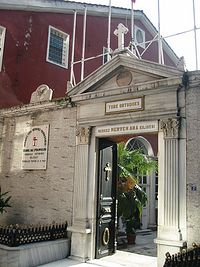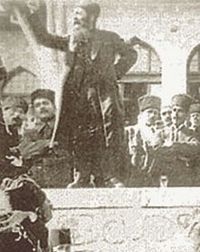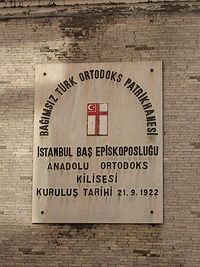SOURCE: Eurasianet.org

|
| Meryem Ana Church |
Turkish prosecutors allege the church, which traces its roots to the upheaval surrounding the founding of the Turkish republic, is connected to an ultra-nationalist movement, known as Ergenekon, which reportedly plotted to overthrow the government of Prime Minister Recep Tayyip Erdoğan.
Church spokesperson Sevgi Erenerol, sister of the current patriarch, has been imprisoned since 2008 on charges that include establishing and directing an armed terrorist organization as part of the supposed Ergenekon conspiracy. A host of ultra-nationalist groups established in 2004 and 2005 had “the same” founders, and “they were all gathering at the Turkish Orthodox Patriarchate,” claimed Orhan Kemal Cengiz, a human rights lawyer.
Meanwhile, Vural Ergül, a lawyer for Erenerol, calls the government’s case “fake and imaginary.” Ergül acknowledged the church’s links to prominent ultra-nationalists, including Ergenekon co-defendant Veli Küçük, who has been linked to the 2007 murder of three Christian missionaries in the eastern town of Malatya, but maintained that both his client and the Turkish Orthodox Church are victims of government persecution.
“Members of the church are scared and anxious,” Ergül said. “It is impossible not to see … [Prime Minister Erdoğan’s] intolerance against the church.”
Beyond the possible Ergenekon connection, Cengiz, the rights lawyer who has worked extensively with Turkey’s non-Muslim minorities, contends that Turkish Orthodox Church members have routinely harassed members of other Christian denominations in Turkey. “It [the Turkish Orthodox Church] has a central role that has not been addressed adequately by the prosecutors,” Cengiz said.
How and why did a tiny Christian church gain a reputation for being antagonistic toward fellow Christians? The answer lies in its origins.

|
| Pavlos Karahisarithis, the founder of Autocephalous Turkish Orthodox Church and its first Patriarch as Papa Eftim I. |
Atatürk took a personal interest in the Turkish Orthodox Church, and expressed his support. Karahisarithis, meanwhile, took the title Papa (“Pope” in Turkish) Eftim, and later changed his last name to the Turkish family name of Erenerol. “Atatürk may have had a pronounced secular view of the world, but he was going against a great trend in history in which religion marked you out as part of a particular group,” commented Anthony O’Mahony, director of the Centre for Eastern Christianity at the University of London’s Heythrop College.
But once Turkey’s 1924 population exchange with Greece took place, Eftim’s potential followers dwindled. The Turkish Orthodox Church’s “raison d’être disappeared” with the 1.2 million Christians who left Anatolia as part of the exchange, said O’Mahony. “History has left it behind.”
Other Orthodox patriarchates never recognized the church. Atatürk, however, did not forget it. Papa Eftim and his family were exempt from the population exchange and moved to Istanbul, where they were given the Meryem Ana Church, which the government expropriated from the Ecumenical Patriarchate. “It [the Turkish church] was conceived as a replacement for the Ecumenical Patriarch and the real Orthodox Church, and as a kind of proxy completely at the service of the state,” elaborated Cengiz Aktar, a political scientist at Istanbul’s Bahçeşehir University.
 |
Together with his sons, Turgut and Selcuk, who, in turn, succeeded him as patriarch, Eftim continually railed against Christian groups, claiming that they were agents of foreign powers.
His grandson, the current patriarch Papa Eftim IV, has largely shunned publicity. Until her arrest, however, his granddaughter, Sevgi, continued to rally feelings against other Christian groups.
At a 2006 security conference hosted by the military, she described missionaries as “a pawn in political chess” whose “only goal is to invade this land.” She was also involved in harassment of the late Turkish-Armenian newspaper editor Hrant Dink, throwing coins and pencils at his lawyers during a court appearance. Dink was shot dead in a 2007 killing linked to Turkey’s ultra-nationalist movement.
“Sevgi Erenerol was one of the most prominent people waging a war against non-Muslims in Turkey,” commented Cengiz, who claimed that the number of attacks and threats against non-Muslims has decreased since Erenerol’s arrest and those of other prominent Ergenekon suspects.
“Although they themselves are supposed to be a minority, they hated other minorities, particularly Armenians,” added Aktar.
Prosecutors are expected to rest their case against Erenerol this month. Ceremonies at the Meryem Ana Church continue uninterrupted, although its future has never been more uncertain. “The number of members … is declining with each passing day,” said Ergül, the lawyer.
Meanwhile for the Erenerol family, which makes up the bulk of the church’s congregation, the charges in no way diminish their belief in the justness of their cause. “As long as we have belief in God,” said Sevgi Erenerol’s 84-year-old mother Claudia, one of the two worshippers at the recent service, “our problems will seem insignificant.”
